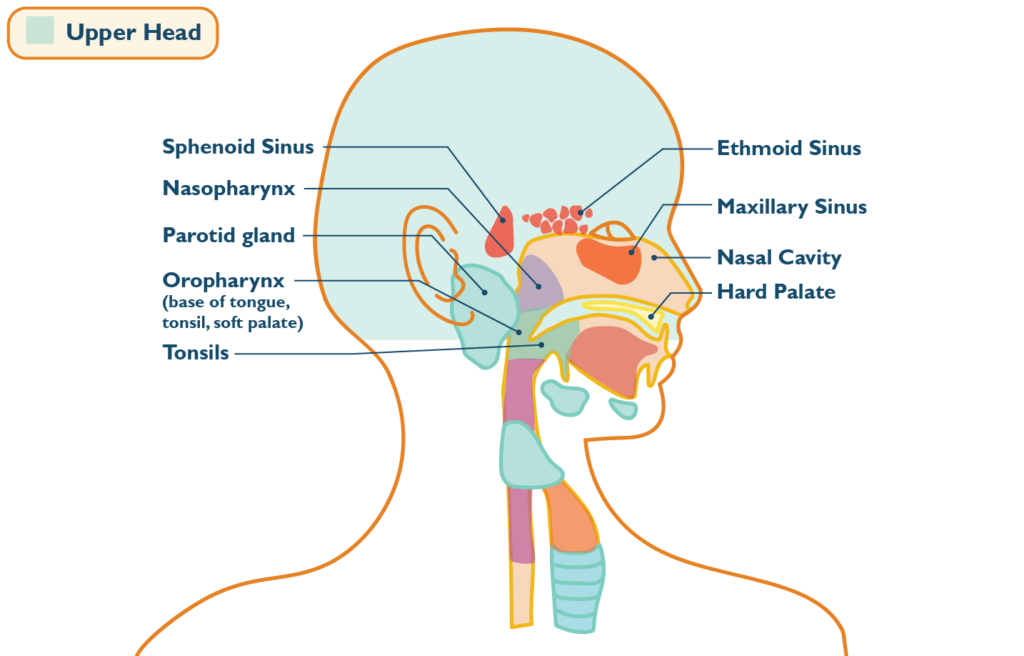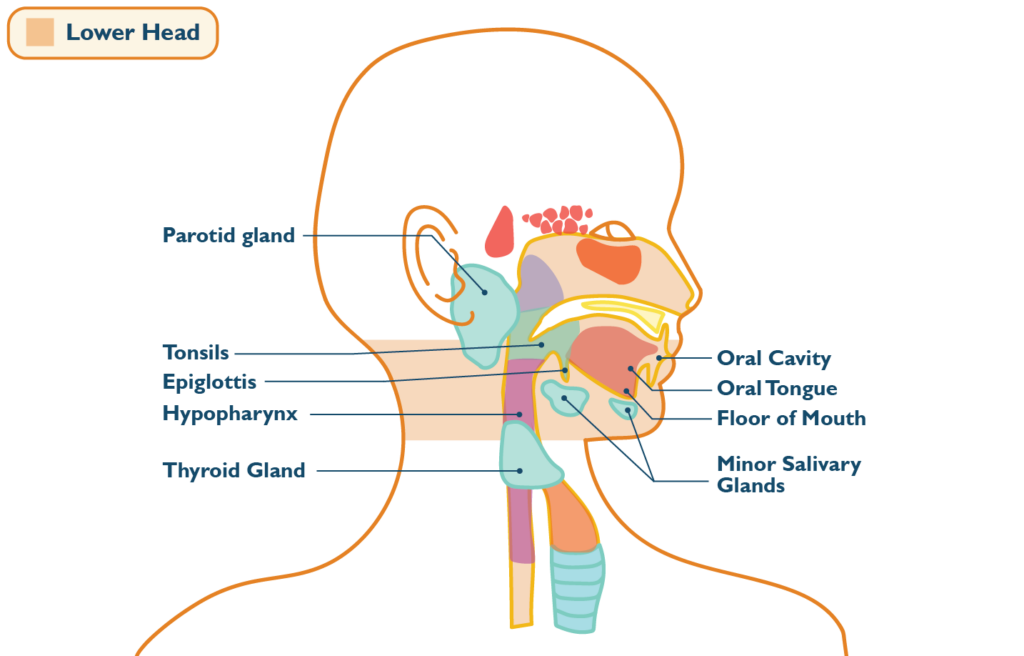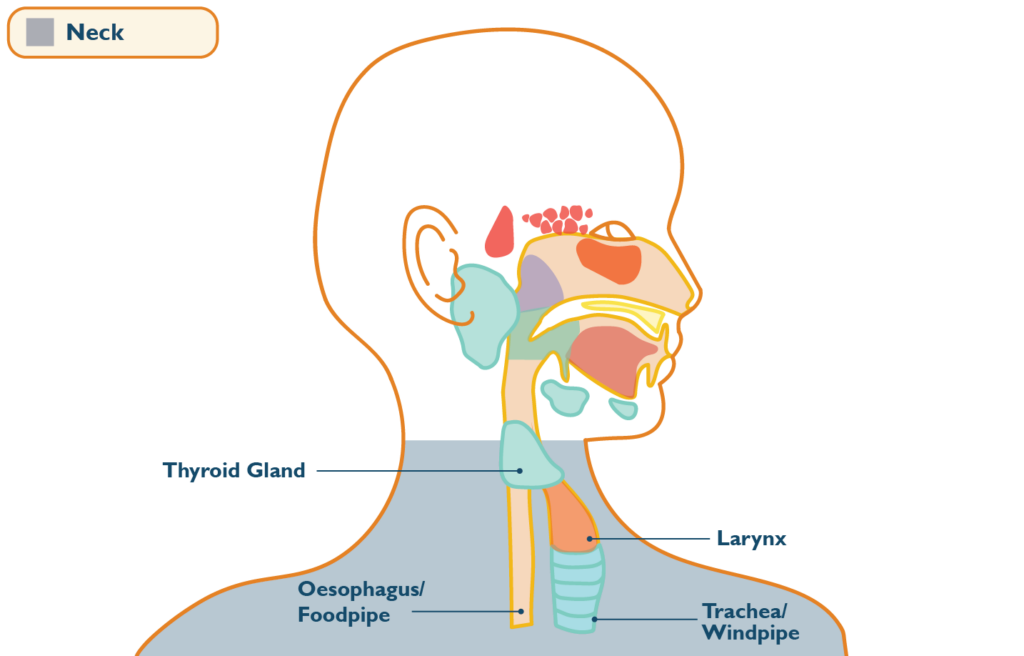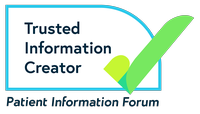Head and Neck cancer: Understanding late effects of radiotherapy
Radiotherapy for head and neck cancer can cause late side effects. They might happen once, carry on over the long term or come and go over time. They can even begin many years later. Sometimes they cannot be cured, but it might be possible to manage them.
These can be life changing for some people. They can vary depending on:
- Which areas are affected
- Other health conditions
- You as a unique patient (age, genes, circumstances)
- Other cancer treatments you might have received
If you start to have new symptoms or pain, open sores or breathing problems it is very important to get medical advice quickly and rule out any further cancer.
There are many sensitive structures in the head and neck region, all close together, which makes side effects complicated and often life changing. Members of our patient engagement group recommend speaking to others that understand and have been through similar treatment.
The possible side effects of radiotherapy treatment, and ideas to support you, have been split into different sections below:
- How likely am I to get side effects?
- Parts of the upper head, lower head and neck
- General late effects for all parts of the head and neck
- Side effects when treating the upper head (nasopharynx, nasal cavity, sinuses, parotid gland, hard palate, oropharynx (base of tongue, tonsil, soft palate))
- Side effects when treating the lower head (oral cavity, hypopharynx, oral tongue, epiglottis, tonsils, parotid gland, salivary glands, floor of mouth)
- Side effects when treating the neck (larynx, trachea (windpipe), oesophagus (food pipe), thyroid gland)
- What can help with late effects
Joining a support group (see further information below) can be a positive way to share your experiences, feel less alone, and come to terms with the physical and emotional impact of treatment. Ask your medical team if you need more support or have any side effects that could be related to radiotherapy treatment.
How likely am I to get late side effects?
Before treatment you will discuss and sign a consent form with your clinical oncologist or therapeutic radiographer. They should tell you what to expect, and you can ask questions and discuss any concerns you have about late effects. It’s important to know what you are consenting to and can help to take someone with you.
You can read different radiotherapy consent forms (HERE) based on the specific area being treated. These consent forms are packed with useful information about early and late side effects. (1)
When you consent to treatment, you are agreeing there is a chance of getting early and late side effects. Your team will use words like Expected, Common, Less Common and Rare.
This table shows what these words mean.
| Wording on the consent form | % chance of side or late effect | How many patients will get this? |
| Expected | 50 to 100% | Between half and all patients |
| Common | 10 to 50% | Up to half of all patients |
| Less common | Less than 10% | Fewer than one in ten patients |
| Rare | Less than 1% | Fewer than one in 100 patients |
Parts of the upper head, lower head and neck
Knowing the different areas of the head and neck can help with understanding the side effects listed below.
The upper head: This area contains sphenoid, ethmoid and maxillary sinuses, the parotid gland, oropharynx (which includes the base of tongue and soft palette), the nasal cavity and hard palette.

The lower head: This includes the tonsils, epiglottis, hypopharynx, oral cavity, oral tongue, the floor of mouth and the salivary glands.

The neck: This section includes the thyroid gland, larynx and both the food and windpipes.

General late effects for all parts of the head and neck
- Cancer-related fatigue: You might find you experience fatigue a long time after your treatment has finished. For some people this can go on for years.
- Dry mouth: Some people find they have a dry mouth that doesn’t go away after treatment. This can get worse over time.
- Lymphoedema: This is where the skin, chin and soft tissue can swell. This can happen if the lymph fluid doesn’t flow well, which is more common if you have lymph glands removed. A physiotherapist can help you to manage this swelling.
- Swallowing problems: This is caused by a narrowing of the food pipe or stricture caused by the treatment.
- Changes in taste and appetite: Food and drink might always taste different, like sweet things tasting salty or metallic. This can make eating less enjoyable. Reach out to your clinical team and seek help from a dietitian. Finding support from others in a similar situation can be useful. Others with late effects can provide valuable tips that helped them deal with; taste changes, keeping a good appetite, recipe ideas etc. This can also help you feel less alone.
- Facial and nerve pain: If you have had surgery, you may feel painful sensations as the nerves try to work again. You may also have facial pain in the area treated by radiotherapy.
- Pituitary gland: Sometimes it might be necessary to take hormones if the pituitary gland does not function well after treatment.
- Hair loss: Hair loss in the area where you had radiotherapy treatment may not grow back.
- Skin changes: The skin in the area treated might get thin, dry, or change color, and you might see small blood vessels that look like lines. These skin changes can show up years after your treatment, and it’s important to take care of your skin and ask your doctor for advice if you notice these changes. The skin in the treatment area will always be more sensitive to the sun. Always protect it by covering up, wearing a hat in the warmer months and using a high factor sunblock.
- Teeth: Radiotherapy can make your teeth more likely to get cavities and decay. It’s important to brush and floss your teeth well and see your dentist regularly after treatment to keep your teeth and jaw healthy.
- Difficulty sleeping: Discomfort and pain from side effects, cancer-related fatigue and poor mental health can make it harder to get good quality sleep.
- Depression and anxiety: This is a very real late effect for patients. Many feel very isolated and lonely because of cancer and recovering from treatment is different for everyone. It is important to recognise how you feel and reach out if you need help. There are many ways to seek help; one to one psychological support for you and your family; peer groups and others who have been through a similar experience. One size does not fit all, it can take time to find what works for you and your loved ones. It is important so speak to your medical team and see if they can connect you with whatever support you need.
- Intimacy issues: Often not talked about, but many patients find their sexual and intimate life changes during and after cancer treatment. Speaking to others who have lived experience can be very helpful and supportive. If you have a Cancer Nurse Specialist (CNS), ask them to discuss this with you. There are also specialists who work within sexual health (sex therapists, sexual psychologists) who can help.
- Trismus: Stiffness in the jaw, exercises can help with this ask to see a speech therapist if this becomes a problem.
Late effects after treatment to the upper head
- Nose: Inside the nose can become permanently dry and crusty, the hair inside often does not grow back. You might lose your sense of smell.
- Eyes: If your eye is close to the treatment area, you might get a cataract, which means your lens will cloud. This can be corrected with minor surgery. Your eyes can become dry, and your sight can change.
- Ears: Hearing loss or hearing changes are dependent on the treatment area, but treatment can bring on tinnitus (persistent ringing or noise)
Late effects after treatment to the lower head
- Tiredness from thyroid problems: Radiotherapy can sometimes make the thyroid gland in your neck work less well, which can make you feel very tired and sluggish. A simple blood test can establish if this is a problem which can be corrected with medication.
- Trouble swallowing: After treatment, you might find it hard or painful to swallow. This can be due to radiotherapy, surgery, or cancer itself. If you are having trouble swallowing, a speech therapist may be able to help. They can assess the problem, sometimes using video fluoroscopy and provide exercises to manage or sometimes improve swallowing issues.
- Jaw problems: It’s less common, but you might also experience jaw stiffness and permanent damage to the jawbone. Radiation can cause necrosis, where there is a lack of blood flow to your bones. This can cause them to be weak and break more easily.
- Voice changes: Your voice might become hoarse after treatment. For many the voice gets better, but sometimes the hoarseness can last for months or change your voice forever, especially if the treatment was near your voice box.
Late effects after treatment to the neck
- Tiredness from thyroid problems: Radiotherapy can sometimes make the thyroid gland in your neck work less well, which can make you feel very tired and sluggish. A simple blood test can establish if this is a problem which can be corrected with medication.
- Stiff neck: The soft tissues in your neck might become hard and stiff, making it tough to move your neck easily. Physical therapy, where you do exercises given by a physiotherapist, can help you keep your neck flexible and make moving easier.
- Neck swelling or lymphoedema: Some people might notice their neck swelling, especially under the chin. This can happen if the lymph fluid doesn’t flow well, which is more common if you have lymph glands removed. A physiotherapist can help you to manage this swelling.
Less common or rare late side effects for the upper head, lower head and neck
- Nerve damage: Permanent changes to your brainstem, spinal cord and nerves to the face, arm or hand are rare but possible.
- Radio necrosis of the brain: Damage to an area of the brain which is not repairable within the original treatment area.
- Open sores (ulcers): Some people might get sores on their skin or inside their mouth that don’t heal properly. This can be uncomfortable and might need extra care to manage them.
- Breathing trouble: You might have trouble breathing because of swelling in the airway, this can make it hard to breathe normally. This is a serious side effect and needs to be looked at by a medical professional straight away.
- Second Cancer: There is a very small chance that you could develop another type of cancer. This is rare, and depends on lots of different factors like age, area treated and radiation dose.
The rarest late side effects
- Nerve or spinal cord issues: Sometimes, radiotherapy might damage the spinal cord. This can feel like an electric shock when you move your neck. This usually goes away on its own and doesn’t need any treatment.
What can help with late side effects?
Always talk to your clinical team, GP or a radiotherapy late effects services about any symptoms you have. There are usually ways they can help you to reduce or manage your symptoms.
- Monitoring rare side effects: Talk to your treatment team as soon as you notice any changes, this can help catch and treat any serious problems early.
- Managing cancer-related fatigue: Food and drink, keeping active, keeping a fatigue diary, medicine like steroids and physiotherapy may all be options for managing fatigue. Speak to your doctor or medical team for advice; and learn more about managing cancer-related fatigue.
- Dry mouth: To help with a dry mouth, it’s important to keep your mouth moist by drinking water regularly. This can make you feel more comfortable. Some patients say they find saliva pastilles helpful. Patients who cannot manage saliva pastilles find various dry mouth sprays beneficial such as Oralieve, AS Saliva Orthana, Bioxtra, Lubricity, Xerotin. You may need to try a few to know what works for you. There are also gels like Biotene, Bioxtragel, GC dry mouth gel, Gengigel, Oralieve, Curaprox, Xerostom and Xyligel. You might be able to manage gum or mints to help with dry mouth. For example, Curaprox Xerostom gum, Dr Heff’s remarkable mints and Peppersmith mints and gum. Xylimelts are quite popular as discs you can stick to your gum or molar. If you don’t have teeth, you can stick them to your cheek or the roof of your mouth.
- Skin care: The skin in the treatment area will always be more sensitive to the sun. Always protect it by covering up and use a high factor sunblock.
- Access a late effects service: There are services that deal with late effects. This area of support continues to grow but is not available everywhere.
- Difficulty sleeping: Meditation, mindfulness and listening to music can help.
- Keeping active: Gentle movement can help you feel better, both during and after treatment.
- Alcohol use: Please follow the NHS guidelines on safe drinking levels and any instructions you get from your team on what is right for you, your diagnosis and your treatment. If in doubt, please ask your team.
- Stop smoking: If you are looking to stop or reduce smoking, there are services available to help you.
- Drinking fluids: Drinking plenty of fluids such as water and squash can help with fatigue and tiredness caused by your treatment. You can try diluted juice if you don’t like water.
There are more than 60 late effects associated with head and neck cancers this is due to the vast area effected by the cancers. Speak to your medical team about any late side effects to rule out cancer returning and get the help and support you need.
Further information
Facebook support groups:
Lifeafterlary UK.🇬🇧 laryngeal cancer | Facebook
Mouth Cancer Foundation Support Group | Facebook
Head and neck cancer – post radiation | Facebook
Head and Neck Cancer – UK Support Group | Facebook
Head and Neck Cancer Support Group UK | Facebook
Head and neck cancer | Macmillan Cancer Support
Further support:
Mouth Cancer Foundation – Support, Education & Research
Macmillan Cancer Support | The UK’s leading cancer care charity
Mouth Cancer Foundation | Helpline: 01924 950 950
The Swallows Head & Neck Cancer Support Group
Oracle Head and Neck Cancer UK – UK’s leading charity in head and neck cancer
Learn more about radiotherapy consent forms (HERE).

